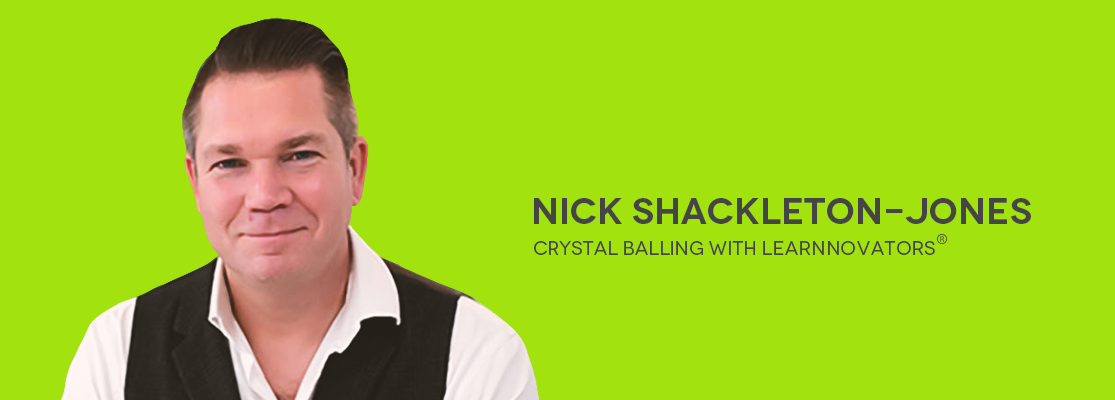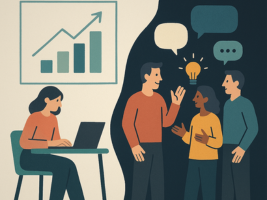NICK SHACKLETON JONES – CRYSTAL BALLING WITH LEARNNOVATORS
ABOUT NICK SHACKLETON JONES:
Nick Shackleton Jones is a revolutionary evangelist responsible for coining the ‘courses to resources’ shift, the affective context model of learning, and the 5Di approach to human-centered learning design.
Nick has a track record of shaping future learning approaches for numerous public and private organizations. He was the former CLO at Deloitte UK, and now, CEO at Shackleton Consulting (www.shackleton-consulting.com).
Nick is a winner of several awards for people development, strategy, innovation, and learning content, including the Learning & Performance Institute’s Award for Services to the Learning Industry, 2017.
He is the author of ‘How People Learn’ (Kogan Page, May 2019; second edition due mid-2022).
He began his professional life as a psychology lecturer, and since that time has worked in a communication consultancy, Siemens, BBC & BP, PA Consulting and Deloitte in roles encompassing learning strategy, culture, leadership, innovation, technology & multimedia.
Nick is a memorable conference speaker, careful leader, & well-known in the corporate learning industry for ground-breaking work & thinking.
ABOUT THIS INTERVIEW SERIES:
Crystal Balling with Learnnovators is a thought-provoking interview series that attempts to gaze into the future of e-learning. It comprises stimulating discussions with industry experts and product evangelists on emerging trends in the learning landscape.
Join us on this exciting journey as we engage with thought leaders and learning innovators to see what the future of our industry looks like.
THE INTERVIEW:
LEARNNOVATORS: We are great fans of you, Nick. You are somebody who knows a lot about how people really learn. Being a revolutionary evangelist known for challenging the conventional ideas around learning, you have been an ardent advocate of shifting the traditional workplace learning strategies we have been following all along. It’s an honor to have you here today to discuss the past, present, and future of workplace learning in three questions.
1. LEARNNOVATORS: (THE PAST) – According to historian Yuval Noah Harari, “Traditionally, life has been divided into two main parts: a period of learning, followed by a period of working. Very soon this traditional model will become utterly obsolete, and the only way for humans to stay in the game will be to keep learning throughout their lives and to reinvent themselves repeatedly. Many, if not most, humans may be unable to do so.” As we understand, in our workplaces of the past, the focus of learning has been on ‘memorizing for recalling’. The idea has been on ‘specializing’ (to become specialists) than ‘generalizing’ (to become generalists), with a goal of a single career for a life term. Maybe, that is something that was designed to work for a bygone era, which worked perfectly then, but is obsolete today in this imagination era. You too feel that we have been wrong about learning all along. You say, “Consider for a moment that in the entire history of humankind, the educational practice of memorizing facts from something one has read and then regurgitating them in a test, is a tiny fraction of our history. It’s a bizarre ritual. It’s been around less time than palmistry. Whatever it is and isn’t, it’s safe to say that human cognition – human learning – was not designed/evolved for this purpose.”As a practitioner who has been guiding many organizations on their learning and development journey, how do you look at this past? And, what are your experiences being an active part of this (past) journey?
NICK SHACKLETON JONES: I don’t think life has been divided into a period of learning and a period of working – throughout human history, these two things were integrated – that is until the industrial revolution when we needed to keep children away from factory machinery and instead locked them in a room, and called it ‘education’. Education doesn’t prepare people for work: most of what we are forced to memorise we forget, and very little is relevant to work in most cases. It’s quite good at training people to keep quiet and do as they are told. Education will come to an end soon – not because it is pointless and brutal – but because economic pressure is driving people to become producers and consumers at an early age. If you can make a living from live streaming your game-play at age 14, why go to school? If you can create an Amazon store and drop-ship at age 12, why would you be sitting in a classroom? To earn a certificate? One that costs $50,000? Will it guarantee a better job? Why, as an employer, would you give a better job to someone just because they have a 2:1 in Art History? Today, we are caught up in silliness. My experience of having been an active part of this journey is that, if you have an enquiring mind, you quickly reach the point where you realise it is nonsense – mere bureaucracy and exploitation.
2. LEARNNOVATORS: (THE PRESENT) – To quote Sugata Mitra (The End of Knowing), “Knowing is obsolete…” He explains “the end of knowing” as “being the end of that way of being in the world where you are supposed to know — before you do.” He recommends replacing acquiring knowledge that is meant for “just-in-case” with learning “just-in-time”. However, as we understand, though today’s workplaces have drastically changed, the way we treat workplace learning is still a reminiscent of the industrial era, and do not see any major shifts in learning and development. According to many experts, we have been designing, developing and delivering learning solutions for our people in the same manner for the past several years. In this context, we find this thought of yours very relevant: “When we talk about ‘performance consulting’ or ‘point-of-need support’, our aim should be to reduce learning as much as possible in order to improve performance. Often, the aim of organizational L&D is ultimately to improve performance so – paradoxically – the main job of L&D teams is increasingly to reduce the need to learn (as more opportunities to externalize knowledge – for example using mobile devices – become available).” As a practitioner who has been able to greatly influence the community on the need for the change, and with vast experience guiding many organizations through the process, how do you look at this (present) scenario? And, what are your experiences being an active part of this journey?
NICK SHACKLETON JONES: Yes– the ‘just in time’ idea is frequently corrupted by the educational paradigm – the idea that learning is storing facts. Imagine having a device in your car that constantly prints out little maps of the immediate area, so that you can navigate by memorizing the directions. Wouldn’t you rather just have a device that tells you to ‘turn left’, ‘turn right’ so that you didn’t have to learn? There is something important at the heart of the ‘just in time’ idea – which is the insight that learning is driven by pressing challenges – so if there is any time you are inclined to learn, it will be at those moments when you face an immediate problem. This is why we use Google, for example. But look closely: whether or not we learn depends on the cognitive trade-off. If it is easier to continue to look things up, then this actively reduces and discourages learning – the London Underground map is a good example. It’s so easy to reference that I don’t have to learn it. This is why I use a shopping list – to reduce my need to learn. Imagine having a translator in your ear – a ‘Babel Fish’ – that translates everything you hear as you hear it. Would this help you learn a foreign language? No. It would stop that happening entirely. People get muddled because they have this silly idea that learning is storing facts like a book or a computer. Let me be crystal clear on this: challenges drive learning. It’s a good idea to provide relevant resources, accessible at the point of need. The better they work as resources, the less learning will take place.
3. LEARNNOVATORS: (THE FUTURE) – To quote Clark Quinn, “We have the opportunity to reinvent what we’re doing. To do that, we have to look very deeply at how learning works, and at what we’re trying to achieve. As we do so, we are going to see that many of the things we are doing are not consonant with how we learn and, in fact, are almost in opposition.” The future of work is hybrid, and hence also the future of workplace learning. As far as we could foresee, learning at our workplaces of the future, that is expected to be disrupted by exponential technologies and characterized by more humanistic features, will look very different. Obviously, Learning and Development (too) will need to don a new (exponential and humanistic) role in this new age for which it needs to reimagine workplace learning that we have been following very religiously without any re-thinking for many years. In this context, it is inspiring to hear you say, “Disruptive times are also an opportunity: a chance to question and perhaps depart from the conventions which we have learned to take for granted.” As an evangelist who have been continuously influencing organizations across the world on the significance of reimagining the ways we have been approaching workplace learning, how do you look at this future? And, what’s your vision for this future?
NICK SHACKLETON JONES: The reason homeopaths are unlikely ever to practice medicine, is that they think they are already practicing medicine. They have so much personally invested in the rituals and mythology that doing something different would represent a catastrophic challenge to their identity. I am more optimistic that disruption will come from without than from within, but I continue to plot trajectories that would allow someone with sufficient desire to achieve escape velocity from education. 5Di is one such trajectory. Like many people, I agree that learning has to change. In fact, learning has to start. Let’s unpack that: Of course, people are learning all the time – but what they are doing is entirely different to what education does. Education does not intentionally involve learning and largely suppresses it. For progress to be made, we would have to begin by shifting away from educational ritual and start doing learning design. There are many people who have this vague sense that this needs to happen – what prevents progress is the absence of a fundamental understanding of learning – or how learning works in humans and other species. This is why I introduced the Affective Context Model, so that at some point in the future, the conversation might begin. Let me be pragmatic not philosophical though: many people are not really interested in these deep questions, they just want to do something that makes a difference today. Human-centred design – because it stems from a proper understanding of learning – can be a practical way to begin making a difference to performance and experience. I think that is our mission, as a profession: to measurably improve the performance and experience of people, in organizations.
LEARNNOVATORS: Before we sign off, we thank you so much for your time today, Nick. We’ve had an amazing time reading your insights with many valuable takeaways. We’ll take these learnings to foster our commitment to practice and promote continuous learning and innovation at work. Thank you!
NICK SHACKLETON JONES: Thank you! I can see that you are continuing to disrupt, and though all change comes at some price, I feel that it is worthwhile.






